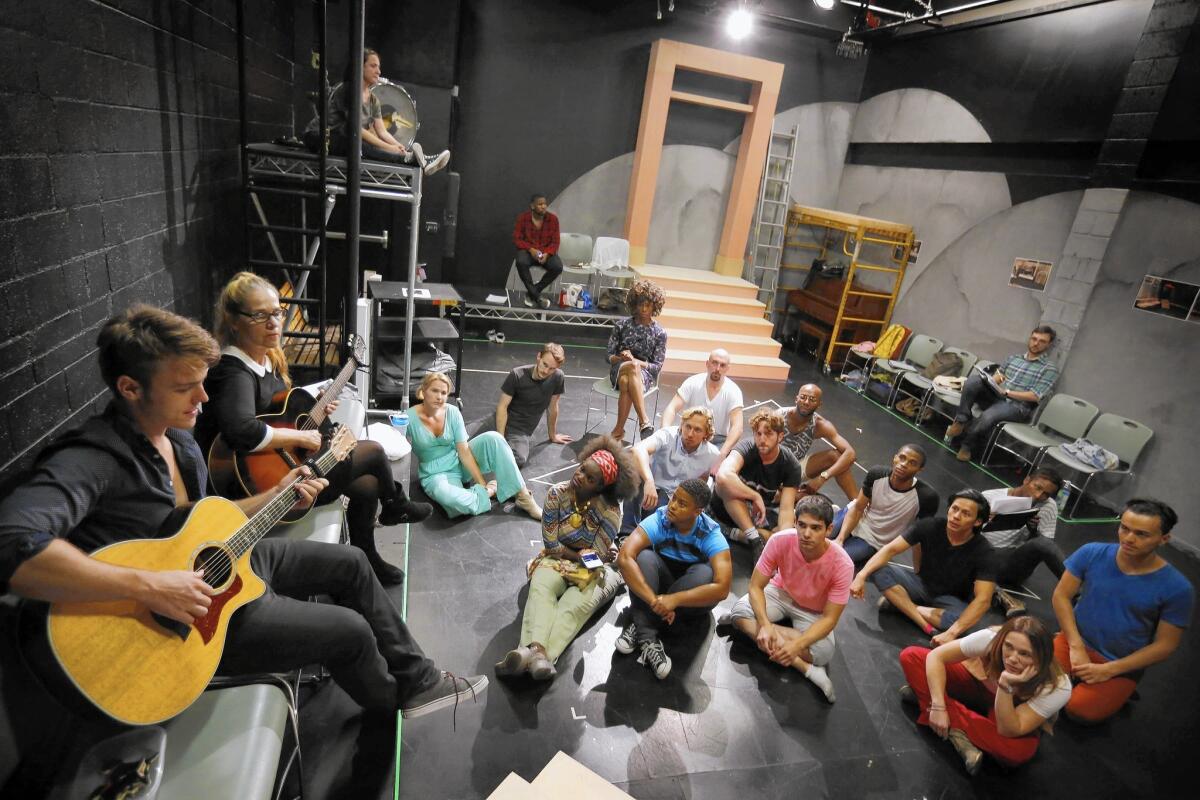‘Hit the Wall’ returns to the spark of the LGBT rights movement

- Share via
The LGBT community has made immense progress in the fight for equality — as seen in the nationwide legalization of same-sex marriage this year and the appointment of the White House’s first openly transgender staff member last month.
But there is concern that a complacency born of ignorance of the gay rights movement could be on the horizon. The people behind the play “Hit the Wall,” premiering on the West Coast at the Los Angeles LGBT Center’s Cultural Arts Center on Sept. 18, aim to prevent that.
“Hit the Wall” revisits the fateful night at New York’s Stonewall Inn in 1969 that resulted in riots by gays, drag queens and transgender people. The riots are often regarded as the single most important event leading to the modern lesbian, gay, bisexual and transgender rights movement.
“Unless we keep revisiting where things started and how they started to change, they’re just going to change back,” said Ken Sawyer, director of the play. “I think we’re witnessing that in America where we thought we had made so many strides in women’s rights and gay rights and social equality, and yet it seems like we’re taking steps back.”
SIGN UP for the free Essential Arts & Culture newsletter >>
In 90 minutes, “Hit the Wall” re-creates the June day and night that led to the Stonewall riots through the eyes of 10 people. Writer Ike Holter created the play for interdisciplinary artists in Chicago known as the Inconvenience, of which he is a member. Performed on three occasions since 2012 in Chicago and off-Broadway, “Hit the Wall” is Holter’s portrayal of the story he heard in fifth grade.
“I looked at it as an identifying point that we didn’t have visual language around,” Holter said by phone. “There are very few pictures around of that first night. I wanted to give these people who were there voices.”
When the play opens in Los Angeles, it will be the first time Holter has not been a part of its production, but he’s given Sawyer free rein to create an immersive theatrical rendition. Jon Imparato, director of the LGBT Center’s Cultural Arts Center, and Adam Silver of the production company Sixth Avenue, are producers. (Silver is also a cast member.)
“The goal is to really immerse you from the moment you walk into the theater into the environment of what was happening at Stonewall,” Imparato said, “not to make it a linear play where you sit down and watch. It’s experiential. This is going to feel like an event, an experience you’ve had.”
A three-person acoustic band will play live original music from Anna Waronker of the band That Dog and Charlotte Caffey of the Go-Go’s. They cite musical influences including Velvet Underground, Queen, Petula Clark and gospel.
Because the play is based on a historical event of which little is universally accepted or known, Holter wrote an ensemble piece that tells the story of the riots through a number of archetypal characters, each based on people in attendance on the first night of the riots. In addition to Silver, the cast includes Jason Caceres, Burt Grinstead, Charlotte Gulezian, Matthew Hancock, Kristina Johnson, Roland Ruiz, Shoniqua Shandai, Donnie Smith and Blake Young-Fountain.
This approach is in stark contrast to the feature film from writer and director Roland Emmerich, “Stonewall,” which opens Sept. 25. In the film, the story of the Stonewall riots is told through the eyes of one person, a fictional white character who moves to New York after being kicked out of his Kansas home by an unsupportive family.
The film’s trailer received online backlash last month for featuring the fictional character as the main instigator of the riots though most accepted accounts attribute that role to drag queens and transgender women of color. Emmerich responded to the criticism in a Facebook post.
“When this film — which is truly a labor of love for me — finally comes to theaters, audiences will see that it deeply honors the real-life activists who were there,” he wrote.
In “Hit the Wall,” the goal is to represent the voices of as many riot participants as possible.
“Even though we know many things that happened, we don’t know everything that happened,” said Imparato. “We wanted to tell the story with being accurate, but yet not trying to be so accurate that it comes off academic.”
Silver, who helped to secure the play for the LGBT Center, hopes that those attending will leave not only educated but having seen themselves in one of the characters, whether LGBT or not.
“I hope that it’s informative and resonates with everyone and the commonality of our experiences,” he said. “This is not just a play about being LGBT or of color or any of that. It’s really about being human and fighting for yourself and being yourself and being able to live in a world where you can do that. This is a civil rights play, and everyone has a dog in that fight.”
Twitter: @TrevellAnderson
More to Read
The biggest entertainment stories
Get our big stories about Hollywood, film, television, music, arts, culture and more right in your inbox as soon as they publish.
You may occasionally receive promotional content from the Los Angeles Times.











